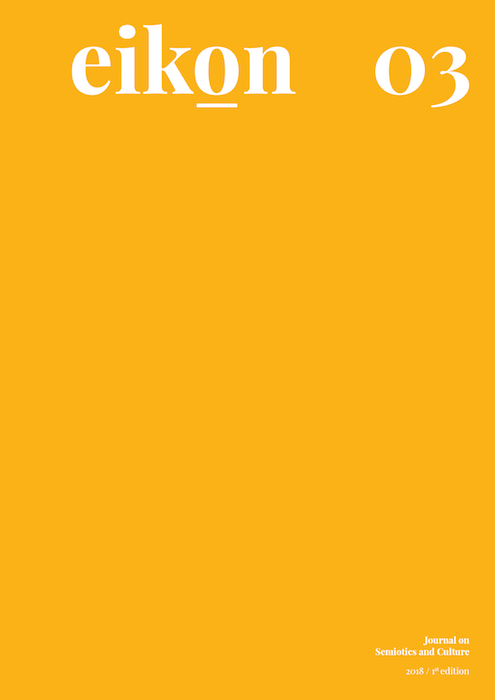The face in the image, the image without face: poverty and vulnerability in journalistic photography about Bolsa-Família Program
Keywords:
Vulnerability, Face, Photojournalistic image, Aesthetics, Alterity, Politics.Abstract
The aim of this paper is to produce an analysis of vulnerability and vocalization of an an ethical demand made by the Other, giving birth to a responsibility relarion with the other’s face. Such concept, derived from the thought of Lévinas and reworked by Butler, is used here to guide the analysis of specific photojournalistic images related to the Bolsa-Família Program. The corpus of the research has a total of 120 images, assembled between 2003 and 2015 from newspapers of great national circulation, such as Folha de S. Paulo, Estado de S. Paulo and O Globo. In order to investigate the political and ethical dimensions of these images, they were grouped into two main axes of signification: a) faceless images: the face cannot make its appearance even if human face is portrayed in them; b) the face in the image / the face of the image: in them the face appears as an appeal, a call that is addressed to us and make us aware of the precariousness and vulnerability of our lives.
References
BUTLER, J. (2011). Vida precária. Contemporânea – Revista de Sociologia da UFSCar. São Carlos, n.1, p.13-33.
BUTLER, J. (2015). Quadros de guerra: quando a vida é passível de luto? Rio de Janeiro: CivilizaçãoBrasileira.
BUTLER, J. (2016). We, the people: thoughts on Freedom of Assembly. In: BADIOU, A., et al. What is a people? Columbia University Press.
BUTLER, J. (2004). Precarious Life. London: Verso.
CABANES, R.; GEORGES, I. (2014). Gestion de la pauvreté et enterpreneuriat de soi: un nouveau compromis de gouvernement au croisement des politiques sociales et néo- liberales?, Brésil(s), n.6, p.7-15.
FASSIN, D. (2006). Souffrir par le social, gouverner par l’écoute: une configura on sémantique de l’action publique. Poli x. Paris, v.19, n.73, p.37-157.
FASSIN, D. (2010). Évaluer les vies: essai d’anthropologie biopolitique. Cahiers internationaux de Sociologie, v.128- 128, p.105-115.
FASSIN, D. (2009). Another politics of life is possible. Theory, culture & society, v.26, n.5, p.44-60.
FASSIN, D. (2015). At the Heart of the State: the moral world of institutions. Pluto Press.
FRASER, N. (1987). Women, Welfare and the Politics of Need Interpretation, Thesis Eleven, n. 17, p.13-27.
FOUCAULT, M. (1980). Poder de morte e direito sobre a vida. In: História da Sexualidade, v.1, A vontade de saber. Rio de Janeiro: Graal, p.127-152.
FOUCAULT, M. ([1981] 2003). Omnes et singulatim. In: MOTTA, M. B. da (ed.). Ditos e Escritos IV, Estratégia, poder-saber. Rio de Janeiro: ForenseUniversitária, p.355- 385.
LAUTIER, B., (2012), La diversité des systèmes de protection sociale en Amérique La ne: une proposition de méthode d’analyse des configurations de droits sociaux, Revue de la régula on, n.11, p.45-59.
LÉVINAS, E. (1999). Alterity and transcendence. New York: Columbia University Press.
LÉVINAS, E. (2007). É ca e in nito. Lisboa: Edições 70. LÉVINAS, E. (1980). Totalidade e in nito. Lisboa: Edições
LÉVINAS, E. (2005). Entre nós: ensaios sobre a alteridade. Petrópolis: Vozes.
LÉVINAS, E. (2011). De outro modo que ser ou para lá da essência. Trad.: José Luiz Pérez e Lavínia Leal Pereira. Lis- boa: Centro de Filoso a da Universidade de Lisboa.
MARQUES, A. (2009). Espaços institucionais e processos de participação cívica de mulheres pobres no contexto do Programa Bolsa-Família. Revista do Observatório do Milênio de Belo Horizonte, v. 2, p. 121-137.
MARQUES, A. (2010). A deliberação a longo prazo no espaço de visibilidade mediada: o Bolsa-Família na mídia impressa e televisiva. Estudos em Jornalismo e Mídia, v. 7, p. 273-285.
MARQUES, A. (2013). Três bases estéticas e comunicacionais da política: cenas de dissenso, criação do comum e modos de resistência. Contracampo, v.26, p.126-145.
MARQUES, A. (2014). Política da imagem, subjetivação e cenas de dissenso. Discursos Fotográficos (Online), v. 10, p. 61-86.
RAGO, M. (2017). Foucault, o neoliberalismo e as insurreições feministas. In: RAGO, M.; GALLO, S. (Orgs.). Michel Foucault e as insurreições: é inútil revoltar-se? São Paulo: Intermeios, p.363-374.
RANCIÈRE, J. (2004). Aux bords du politique. Paris: Gallimard.
RANCIÈRE, J. (1995). La Mésentente – politique et philosophie. Paris: Galilée.
RANCIÈRE, J. (2007). Le travail de l’image. Multitudes, n.28, p.195-210.
RANCIÈRE, J. (2010a). Ten Thesis on poli cs. In: Dissensus: on politics and aesthetics. Edited and translated by Steven Corcoran. London : Continuum, p.27-43.
RANCIÈRE, J. (2010b). The ethical turn of aesthetics and politics. In: Corcoran, S. (Ed). Dissensus: on politics and aesthetics. Londres: Continuum, p.184-202.
RANCIÈRE, J. (2012). O espectador emancipado. São Pau- lo: Mar ns Fontes.
RANCIÈRE, J. (2011). Aisthesis. Paris: Galilée.
TASSIN, E. (1992). Espace commun ou espace public? L’antagonisme de la communauté et de la publicité, Hermès, 10, 1992, p.23-37.
Downloads
Published
Issue
Section
License
Authors who publish with this journal agree to the following terms:
- Authors retain copyright and grant the journal right of first publication with the work simultaneously licensed under a Creative Commons Attribution License that allows others to share the work with an acknowledgement of the work's authorship and initial publication in this journal.
- Authors are able to enter into separate, additional contractual arrangements for the non-exclusive distribution of the journal's published version of the work (e.g., post it to an institutional repository or publish it in a book), with an acknowledgement of its initial publication in this journal.
- Authors are permitted and encouraged to post their work online (e.g., in institutional repositories or on their website) prior to and during the submission process, as it can lead to productive exchanges, as well as earlier and greater citation of published work (See The Effect of Open Access).

